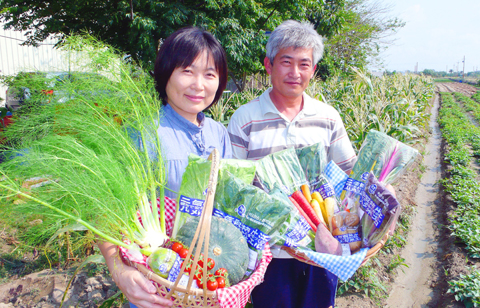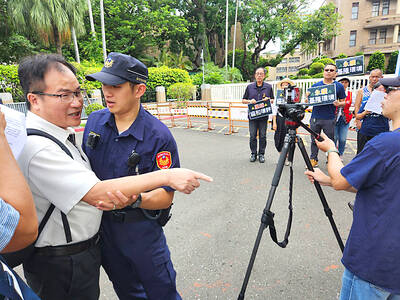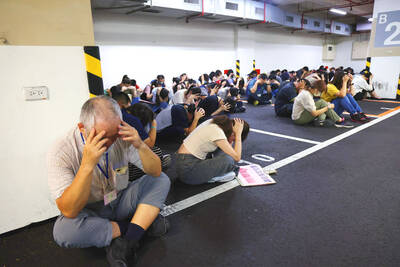When Lin Chung-chih (林中智) and his wife Shih Na-li (施娜莉) decided 14 years ago to go into organic farming, neither of them had any experience in the field. He was a new industrial design graduate and she was an art and design worker.
They started by leasing 0.6 hectares of land in Chiali, Tainan County, and borrowing NT$500,000. Then the couple set about learning the business of organic farming from the ground up.
“Because we had never worked on a farm before, we had to start from scratch to learn about agriculture and had to do so in a very short period of time,” Lin said.

PHOTO: CNA
They spent the first year on the farm experimenting with various exotic crops in an effort to find those that were best suited to local conditions. They did all the manual work themselves and sought the advice of experts from several agricultural research institutes and improvement stations.
Chen Chun-shi (陳俊士) of the Council of Agriculture said one of the main concerns for organic farmers is that the work is more time-consuming and the yield is less than when conventional farming practices are used.
Another major challenge is pest control, as pests thrive in Taiwan’ s hot, humid summers and its winters are not cold enough to stop the proliferation of insects.
“Under normal conditions, only one -third of the organic vegetables planted are harvested. The rest is more often than not destroyed by insects, and if the weather is unfavorable, there is usually nothing left to harvest,” Lin said.
Nonetheless, Lin and Shih gradually acquired expertise in growing organic crops. But they soon faced another challenge, as they had to apply their minds to the business of selling their produce in an uncertain market.
In 1996, there were 160 hectares of land organically farmed in Taiwan. By last year, nearly 1,000 households had become involved in organic farming and 2,386 hectares, or less than 1 percent of the nation’s farmland, were dedicated to organic crops, Chen said.
Lin, who was trying to break into the business in the late 1990s, had to first assess the market.
Within a few years, by forging partnerships with supermarkets and hypermarkets that agreed to distribute their produce, the couple gained a reputation as expert growers of organic vegetables.
The couple decided to expand their business by buying the land they were farming and leasing other plots close by.
They also contracted some of the cultivation to other farmers in an effort to meet growing demand for their organic vegetables.
That’s when the trouble started.
A batch of vegetables grown by contract farmers was found to contain pesticide residues, leading to a series of returns and cancellation of orders.
Chen said that when farmers decide to shift to organic farming, they have to let their fields lie fallow for three years to get rid of the chemicals in the soil.
The crops are then planted and fertilized with natural organic fertilizers such as soybean residue, grain powder and rice bran, he said. There is no use of pesticides, synthetic fertilizers or genetically modified organisms, he said.
In their case, pesticides probably leeched from nearby plots into the soil on the land the contract farmers in northern Taiwan used to plant the vegetables, Lin said.
Lin said he also questioned the methods used by agencies and consumers’ groups to detect pesticide levels in products.
Because of the blow to their reputation, the couple suffered losses of about NT$20 million (US$618,000). They were forced to sell their farm machinery and food production equipment to offset the deficits.
However, with encouragementsfrom their friends and reaffirming their dedication to eco-friendly agriculture, they soon decided to try to revive the business.
Amid growing competition from other organic food companies owned by big businesses, the couple adopted a strategy of diversifying into products such as colorful vegetables rarely seen in Taiwan.
They now only contract out cultivation to reputable farmers.

Environmental groups yesterday filed an appeal with the Executive Yuan, seeking to revoke the environmental impact assessment (EIA) conditionally approved in February for the Hsieh-ho Power Plant’s planned fourth liquefied natural gas (LNG) receiving station off the coast of Keelung. The appeal was filed jointly by the Protect Waimushan Seashore Action Group, the Wild at Heart Legal Defense Association and the Keelung City Taiwan Head Cultural Association, which together held a news conference outside the Executive Yuan in Taipei. Explaining the reasons for the appeal, Wang Hsing-chih (王醒之) of the Protect Waimushan Seashore Action Group said that the EIA failed to address

Taipei on Thursday held urban resilience air raid drills, with residents in one of the exercises’ three “key verification zones” reporting little to no difference compared with previous years, despite government pledges of stricter enforcement. Formerly known as the Wanan exercise, the air raid drills, which concluded yesterday, are now part of the “Urban Resilience Exercise,” which also incorporates the Minan disaster prevention and rescue exercise. In Taipei, the designated key verification zones — where the government said more stringent measures would be enforced — were Songshan (松山), Zhongshan (中山) and Zhongzheng (中正) districts. Air raid sirens sounded at 1:30pm, signaling the

The number of people who reported a same-sex spouse on their income tax increased 1.5-fold from 2020 to 2023, while the overall proportion of taxpayers reporting a spouse decreased by 4.4 percent from 2014 to 2023, Ministry of Finance data showed yesterday. The number of people reporting a spouse on their income tax trended upward from 2014 to 2019, the Department of Statistics said. However, the number decreased in 2020 and 2021, likely due to a drop in marriages during the COVID-19 pandemic and the income of some households falling below the taxable threshold, it said. The number of spousal tax filings rebounded

A saleswoman, surnamed Chen (陳), earlier this month was handed an 18-month prison term for embezzling more than 2,000 pairs of shoes while working at a department store in Tainan. The Tainan District Court convicted Chen of embezzlement in a ruling on July 7, sentencing her to prison for illegally profiting NT$7.32 million (US$248,929) at the expense of her employer. Chen was also given the opportunity to reach a financial settlement, but she declined. Chen was responsible for the sales counter of Nike shoes at Tainan’s Shinkong Mitsukoshi Zhongshan branch, where she had been employed since October 2019. She had previously worked